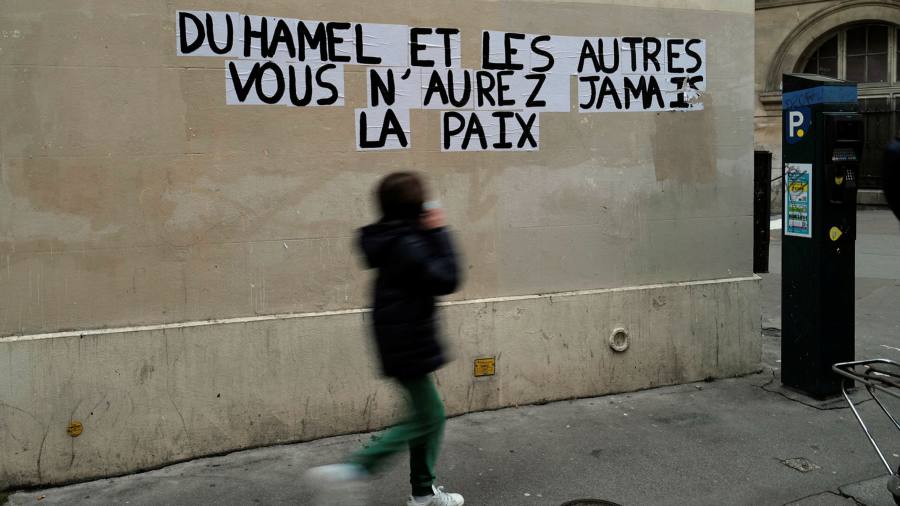[ad_1]
The child sex abuse scandal that is convulsing the cultural elites of Paris has distinctively French traits, but the ugly phenomenon itself knows no national boundaries. Other examples involve the British entertainment industry, the disgraced US financier Jeffrey Epstein and the terrible offences uncovered in Roman Catholic church hierarchies worldwide.
These cases illustrate that evil flourishes under the protection of power, money and fame. They demonstrate that, as in politics, the cover-up by those in the know can be as bad as the offence itself. Finally, each example offers a lesson in the courage needed, when the surrounding culture prefers silence, for victims to name the abusers and their accomplices.
Emmanuel Macron, France’s president, took aim at this silence last month in a video posted on social media. “You will never again be alone,†he promised victims of incest and other sexual violence against children. He was speaking after accusations of child abuse levelled at Olivier Duhamel, a prominent French intellectual, in a book by Camille Kouchner, Mr Duhamel’s stepdaughter.
Mr Duhamel, 70, has termed the allegations a “personal attackâ€. Ms Kouchner alleged that he sexually abused her twin brother. No less severe is her description of a closed Parisian milieu of celebrity writers, thinkers and media professionals among whom there were those who allegedly knew what was going on but pretended or even believed it was nothing unusual.
It is this milieu, centred on the fashionable district of Saint-Germain-des-Prés, that Ms Kouchner had in mind when she gave her book the title La familia grande. Translatable as “the extended familyâ€, it identifies and condemns a self-selecting, self-regarding intellectual elite that behaved in a mafia-like way, with a code of silence shielding it from scrutiny.
It is extraordinary to recall that some of France’s most revered intellectuals saw no shame in the 1970s in calling for the decriminalisation of paedophilia. A petition signed by Jean-Paul Sartre, Simone de Beauvoir, Jacques Derrida and other luminaries proposed that French law “should acknowledge the right of children and adolescents to have relations with whomever they chooseâ€.
Such attitudes were the expression of a highly publicised assault on “bourgeois morality†that was both cause and consequence of the quasi-revolutionary événements of May 1968. One slogan of that era was il est interdit d’interdire — “it is forbidden to forbidâ€. When it was applied to sexual behaviour, children had no say in the matter.
The most notorious figure in Britain’s worst ever sex abuse scandal was no intellectual but Jimmy Savile, a disc jockey and television presenter. In 1990, long before his victims told their harrowing stories in public, he was honoured with a knighthood for charity work. But a police report published in 2013, two years after his death, concluded that Savile had been “hiding in plain sight and using his celebrity status . . . to gain uncontrolled access to vulnerable people across six decadesâ€.
To stop Savile’s crimes, someone had to speak out — and it turned out, after his death, that someone had, as early as 1978. It was Johnny Rotten, lead singer in the Sex Pistols punk rock band. But his was a lone voice. The interview in which he denounced Savile was never broadcast, and did not come to light until almost 40 years later.
Just as in Paris, plenty of people in London knew or suspected the truth. But, as with France’s intellectual elites, the British media and entertainment business was accountable to no one but itself. It was a similar story in the Catholic world, where the religious establishments of Germany, Ireland, Poland, the US and other countries dealt with paedophile priests by quietly moving them from one parish to another.
In America, a distinguishing factor has been abuse of the law and wealth. Epstein — who died in 2019 — sought to keep his crimes out of the public eye with plea bargains and non-disclosure agreements. Pop star Michael Jackson resolved a contested accusation against him in 1994 with an out-of-court settlement.
Will the right lessons be drawn from all these events? Some signs are encouraging. First, the authorities in many countries seem less willing to turn a blind eye to child abuse. France’s Senate, or upper legislative chamber, passed a bill last month to criminalise sexual acts between adults and children under 13. Second, ordinary people appear less afraid to speak out, as thousands are doing in France under the social media hashtag #MeTooInceste.
But in truth the struggle against child abuse, and the culture of silence that abets it, has only just started.
[ad_2]
Source link





